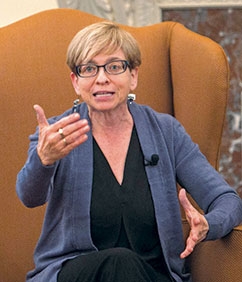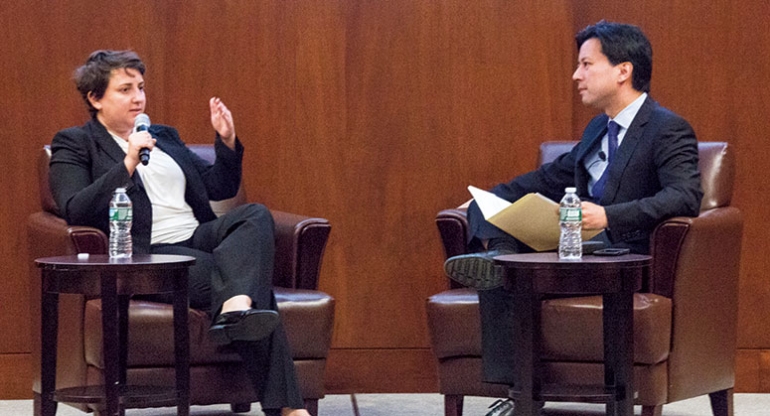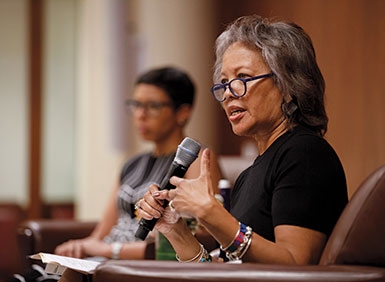Shining a Light on Sexual Misconduct
Speakers discussed how to make reporting sexual harassment safer in the American workplace—and in Supreme Court nomination hearings.
As the #MeToo movement marked its one-year anniversary, sexual misconduct allegations against powerful figures in media, business, politics, and the arts continued to surface. Last September, Chai Feldblum, then a commissioner of the Equal Employment Opportunity Commission, spoke with Professor Melissa Murray about what individuals and organizations can do to prevent harassment and create safe environments for all. The event kicked off the academic year’s speaker series for the Center for Diversity, Inclusion, and Belonging (CDIB) and was co-sponsored by the Birnbaum Women’s Leadership Network (BWLN) and Law Women.
“Stopping harassment requires changing workplace culture,” said Feldblum. “…Law is not necessarily the best mechanism for changing culture. It is, from my perspective, one essential element of changing culture, because it can help change behavior, but it’s only one element.”
In October, Julie Fink ’05, managing partner at Kaplan Hecker & Fink, joined Chief Justice Earl Warren Professor of Constitutional Law Kenji Yoshino for a conversation about the legal future of the #MeToo movement, including the role of the TIME’S UP Legal Defense Fund. Co-founded by Kaplan Hecker partner Roberta Kaplan, the TIME’S UP fund provides subsidized legal support to those who have experienced sexual harassment or assault in the workplace. The discussion was part of the CDIB’s speaker series and was co-sponsored by the BWLN.
When Yoshino asked Fink for her response to Brett Kavanaugh’s just-concluded US Supreme Court confirmation hearings—in which Kavanaugh faced claims of sexual assault before being confirmed as a justice—Fink said that she wished there had been a fuller investigation, and that the hearings had gone differently.
“The path to progress is never a straight line,” she added. “There are always setbacks and always disappointments.”
In a discussion two weeks earlier, amid national debate over Christine Blasey Ford’s sexual assault claims against Kavanaugh, Murray and Professor of Clinical Law Kim Taylor-Thompson looked back to the 1991 hearings preceding Clarence Thomas’s nomination to the Court to consider how much had changed in 27 years—and how much hadn’t.
Taylor-Thompson was a member of Anita Hill’s legal team when Hill raised sexual harassment allegations against Thomas, and in September 2018 Murray testified before the Senate Judiciary Committee in opposition to Kavanaugh’s confirmation. Their discussion was co-sponsored by the BWLN, which Murray co-directs; the CDIB; and the Center on Race, Inequality, and the Law.
In both the Thomas and the Kavanaugh hearings, Taylor-Thompson said, the women who came forward were treated as if on trial, both were accused of playing a part in a political conspiracy to undermine the nominee, and both were forced to relive, in vivid detail, the specifics of their assault or harassment while trying to remain believable to the committee.
“Dr. Ford was praised for her vulnerability whereas Anita Hill was pilloried for her stoicism,” Murray said. “Race was in play here,” Taylor-Thompson added. “And so [Hill’s] ability to not fit a stereotype and to be seen as somebody who was stoic, that was used against her. Imagine if she had been emotional or shown some level of vulnerability—then she would have been attacked for that.”
Posted September 4, 2019




